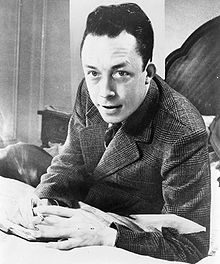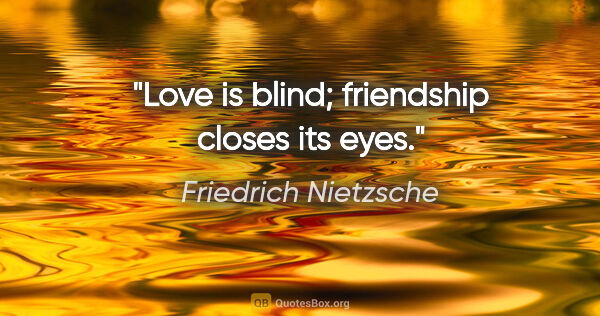
Friedrich Nietzsche quotes about eyes
Deutsch Philosopher, Writer October 15, 1844 – August 25, 1900
Friedrich Nietzsche quotes in frenchFriedrich Nietzsche quotes in russian
Friedrich Nietzsche quotes in german
Cite this Page: Citation
Quotes
A state, is called the coldest of all cold monsters. Coldly lieth it also; and this lie creepeth from its mouth: "I, the state, am the people."It is a lie! Creators were they who created peoples, and hung a faith and a love over them: thus they served life. Destroyers, are they who lay snares for many, and call it the state: they hang a sword and a hundred cravings over them. Where there is still a people, there the state is not understood, but hated as the evil eye, and as sin against laws...
Friedrich Nietzsche
The slow arrow of beauty. The most noble kind of beauty is that which does not carry us away suddenly, whose attacks are not violent or intoxicating (this kind easily awakens disgust), but rather the kind of beauty which infiltrates slowly, which we carry along with us almost unnoticed, and meet up with again in dreams; finally, after it has for a long time lain modestly in our heart, it takes complete possession of us, filling our eyes with tears, our hearts with longing. What do we long for...
Friedrich Nietzsche
And he will also find the little god whom girls like best: beside the well he lies, still, with his eyes shut. Verily, in bright daylight he fell asleep, the sluggard! Did he chase after the butterflies too much?... He may cry and weep - but he is laughable even when he weeps. And with tears in his eyes he shall ask you for a dance and I myself will sing a song for his dance: a dancing and mocking song on the spirit of gravity... (p.108 - The Dancing Song)
Friedrich Nietzsche
He who has attained the freedom of reason to any extent cannot, for a long time, regard himself otherwise than as a wanderer on the face of the earth - and not even as a traveler towards a final goal, for there is no such thing. But he certainly wants to observe and keep his eyes open to whatever actually happens in the world; therefore he cannot attach his heart too firmly to anything individual; he must have in himself something wandering that takes pleasure in change and transitoriness.
Friedrich Nietzsche

The bright image projections of the Sophoclean hero--in short, the Apollinian aspect of the mask--are necessary effects of a glance into the inside and terrors of nature; as it were, luminous spots to cure eyes damaged by gruesome night. Only in this sense may we believe that we properly comprehend the serious and important concept of "Greek cheerfulness." The misunderstanding of this concept as cheerfulness in a state of unendangered comfort is, of course, encountered everywhere today.
Friedrich Nietzsche
Knowing one's 'individuality'. - We are too prone to forget that in the eyes of people who are seeing us for the first time we are something quite different from what we consider ourselves to be: usually we are nothing more than a single individual trait which leaps to the eye and determines the whole impression that we make.
Friedrich Nietzsche
For it is the fate of every myth to creep by degrees into the narrow limits of some alleged historical reality, and to be treated by some later generation as a unique fact with historical claims...this is the way in which religions are wont to die out: under the stern, intelligent eyes of an orthodox dogmatism, the mythical premises of a religion are systematized as a sum total of historical events; one begins apprehensively to defend the credibility of the myths, while at the same time one...
Friedrich Nietzsche
To live with tremendous and proud composure; always beyond —. To have and not to have one's affects, one's pro and con, at will; to condescend to them, for a few hours; to seat oneself on them as on a horse, often as on an ass — for one must know how to make use of their stupidity as much as of their fire. To reserve one's three hundred foregrounds; also the dark glasses; for there are cases when nobody may look into our eyes, still less into our "grounds." And to choose for company that...
Friedrich Nietzsche
To learn to see- to accustom the eye to calmness, to patience, and to allow things to come up to it; to defer judgment, and to acquire the habit of approaching and grasping an individual case from all sides. This is the first preparatory schooling of intellectuality. One must not respond immediately to a stimulus; one must acquire a command of the obstructing and isolating instincts.
Friedrich Nietzsche
- 1
- 2
Popular Author
Related Authors
-
 Albert Camus Philosopher, Writer
Albert Camus Philosopher, Writer -
 Campbell Scott Actor
Campbell Scott Actor -
 Friedrich Nietzsche Philosopher, Writer
Friedrich Nietzsche Philosopher, Writer -
JR
Jean-Jacques Rousseau Philosopher, Writer
-
 Jean-Paul Sartre Philosopher, Writer
Jean-Paul Sartre Philosopher, Writer -
JH
Jeff Hawkins Inventor
-
KM
Karl Marx Philosopher, Writer
-
 Michel de Montaigne Philosopher, Writer
Michel de Montaigne Philosopher, Writer -
PK
Pauline Kael Critic
-
RM
Robert M. Pirsig Philosopher, Writer
